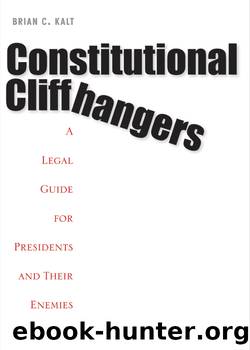Constitutional Cliffhangers by Brian C. Kalt

Author:Brian C. Kalt
Language: eng
Format: epub
ISBN: 9780300123517
Publisher: Yale University Press
7
Getting Out of Trouble
SOME OF THE CLIFFHANGERS IN THIS BOOK are more likely to occur; others are less likely. Some would cause a “crisis” others would only rise to the level of “interesting predicament.” Some would be resolved in court; others in Congress, the White House, or the streets. Some would be easy to prevent or fix; others would be practically impossible. With all of them set out, we can identify some common threads and some lessons learned.
This chapter focuses on three areas: (1) ways that law interacts with politics when constitutional cliffhangers are resolved; (2) ways that constitutional weak spots get patched up, either before or after they cause problems; and (3) ways to improve constitutional and legislative drafting to prevent such weak spots from developing in the first place.
Resolution: Law and Politics
Constitutional cliffhangers like the ones in this book are dramatic for two reasons. First, they are rare, so they are startling when they happen. Second, they take place in the high-stakes realm of presidential power.
An important effect of this is engagement. Take the 2000 Florida recount. If such electoral meltdowns were routine, or if the deadlocked election had been for the state agriculture commissioner rather than for president, the recount would not have transfixed the nation for six weeks and beyond. When the public is engaged in a legal issue in this way, it is no longer a matter just for lawyers to resolve, with just their lawyerly techniques. Politics is front and center. This can have noteworthy effects, depending on the forum in which the cliffhanger plays out. It also illuminates some interesting features of Congress and the courts, not just the presidency.
Politics in Court
Two of our cliffhangers would be resolved in court, simply because that's where they would arise in the first place, as a prosecutor pursues a sitting president (Chapter 1) or pursues an ex-president who had pardoned himself (Chapter 2). The presidential defendant would assert his constitutional defenses in both cases, and the courts would have to decide if the case against him could go forward.
One would hope that a case that is completely in the courts’ domain would be decided as a matter of law, not politics. Another way to express this is to hope that these cases would come out the same way in court regardless of whether the president was a Democrat or a Republican. When President Clinton argued that he was immune from Paula Jones's civil suit against him, for example, all nine justices disagreed, including the four “liberal” justices. Similarly, when President Nixon refused to turn over the Watergate tapes, the Supreme Court—much of which Nixon had appointed—was unanimous in ordering him to.1
There are problems with trying to keep politics out of law, though. It can be hard to draw a bright line dividing law from politics. The starting point for most cliffhangers is that the law is unclear; legally, the case could go either way. When the law is in equipoise but the politics are not—when the
Download
This site does not store any files on its server. We only index and link to content provided by other sites. Please contact the content providers to delete copyright contents if any and email us, we'll remove relevant links or contents immediately.
The Secret History by Donna Tartt(16621)
The Social Justice Warrior Handbook by Lisa De Pasquale(11489)
Thirteen Reasons Why by Jay Asher(7788)
This Is How You Lose Her by Junot Diaz(5769)
Weapons of Math Destruction by Cathy O'Neil(5036)
Zero to One by Peter Thiel(4824)
The Myth of the Strong Leader by Archie Brown(4789)
Promise Me, Dad by Joe Biden(4447)
Beartown by Fredrik Backman(4415)
Stone's Rules by Roger Stone(4415)
How Democracies Die by Steven Levitsky & Daniel Ziblatt(4398)
The Fire Next Time by James Baldwin(4342)
100 Deadly Skills by Clint Emerson(4076)
A Higher Loyalty: Truth, Lies, and Leadership by James Comey(4032)
Rise and Kill First by Ronen Bergman(4012)
The David Icke Guide to the Global Conspiracy (and how to end it) by David Icke(3881)
The Farm by Tom Rob Smith(3872)
Secrecy World by Jake Bernstein(3782)
The Doomsday Machine by Daniel Ellsberg(3730)
